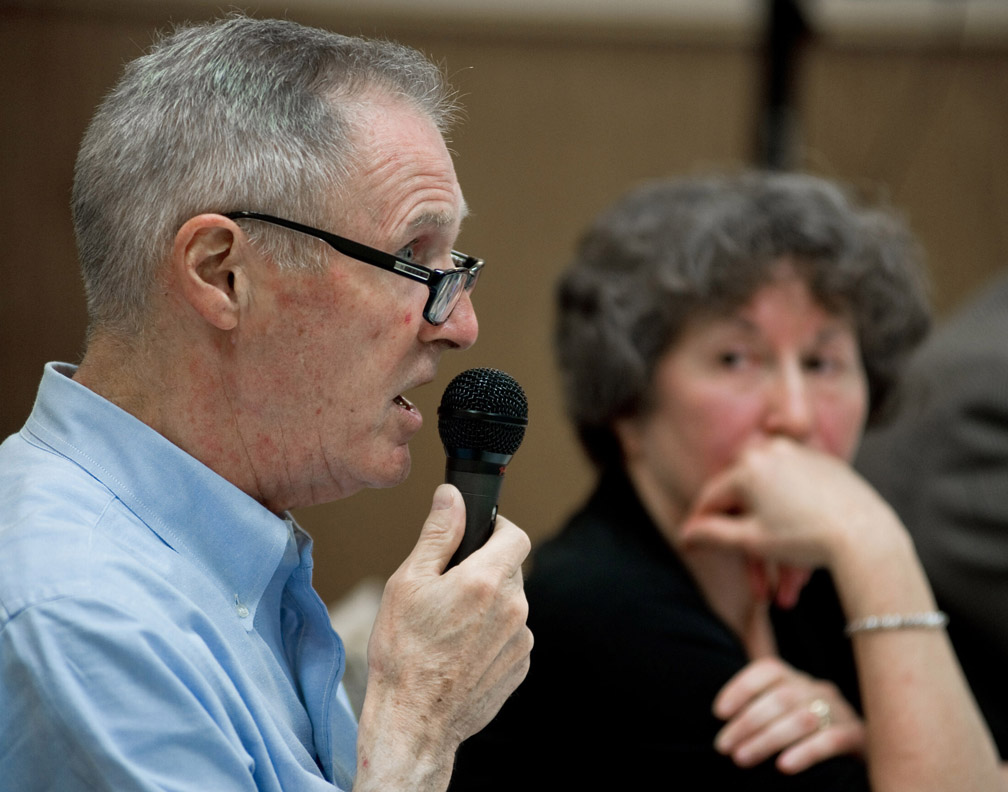JUNEAU — More than 100 Juneau residents filled the Mendenhall Valley Public Library Monday evening for a question and answer session with four state leaders on the oil tax referendum voters will decide on next month.
Proponents of the “Yes” side — those who oppose Senate Bill 21, and therefore are voting “yes” to repeal it — included democratic Rep. Les Gara of Anchorage and Lisa Weissler, a Juneau attorney specializing in oil, gas and mining law. They faced off against former Alaska Electric Light & Power president Bill Corbus and Jim Clark, the chief-of-staff under Gov. Frank Murkowski’s administration.
During the first hour, the forum was dedicated to prepared questions, such as, “What happens if Alaskans vote to repeal SB 21? Does the state go back to the old system, or what?”
“Voting ‘Yes’ will put ACES back in place, and I believe we’ll go back then and write a smarter law that takes the best of everything we can find but doesn’t give away the farm,” Gara said, adding that the Democrat-backed proposal focuses on providing financing for smaller independent oil companies hoping to get involved with North Slope oil.
Advocating for a reform to the oil tax law that only granted tax credits on investment in Alaska, Gara said repealing SB 21 now will give Alaskans a better product in the near future that includes strengths from both sides of the debate.
Clark emphasized that SB 21 will need to be tweaked as time goes on — saying Alaskans should “mend, not end” — and Corbus agreed, saying this tax structure is good for Alaska over the “mid-to-long term.”
“If we go back to ACES, the industry is going to take that as a sign that Alaska is not a good place to do business,” Corbus said, explaining that the industry’s projected investment figures rose by about 33 percent as a result of SB 21 becoming law.
“I would expect the industry would back off those figures, and that we would be looking at less investment in Alaska and you’d see us return to the decline that we’ve observed in oil production over the last six years — maybe accelerating,” he added.
A contentious debate arose between Gara and Clark over one of the staples in SB21 — the base production tax rate. Put simply, Clark says it’s 35 percent; Gara says that is only true if the price of oil hits $160 a barrel.
A section in the law identifies that number as 35 percent after listing a series of exceptions to that rule, but Gara points to an oft-cited report from May by Scott Goldsmith that includes a chart that indicates the “effective tax rates” only hit 35 percent when oil approaches the $160 threshold. According to the chart, the effective rate at approximately $110 a barrel is around 27 percent.
Clark defended the prospect of lower tax rates for larger quantities of oil as an economic positive for the state’s revenue stream.
“With that much oil … all we need is an increase of 2-to-4 percent, and that increase — even at lower tax rates — will produce more total revenue for the state than going to ACES’ asymmetrical tax system and hoping that the wars in the Middle East continue so that the price of oil goes up and we can recover,” Clark said.
Longtime Juneau resident Marshal Kendziorek came to the forum with a strong opinion that SB 21 needs to be repealed, but with an open mind on the matter. He wanted to see if the proponents of Republican Gov. Sean Parnell’s hallmark oil tax reform could sway him.
They didn’t.
“Nothing here changed my opinion,” Kendziorek told the Empire after the forum. “SB 21 gave away far more than it got, and I think it’s important that Alaska gets it’s fair share.
“All I heard (the SB21 proponents) say was, ‘trust us, this will be better’ even though they had nothing to support that,” he added.
Alaskans will determine the fate of SB 21 at the polls on Aug. 19.
Matt Woolbright is a reporter for the Juneau Empire.


